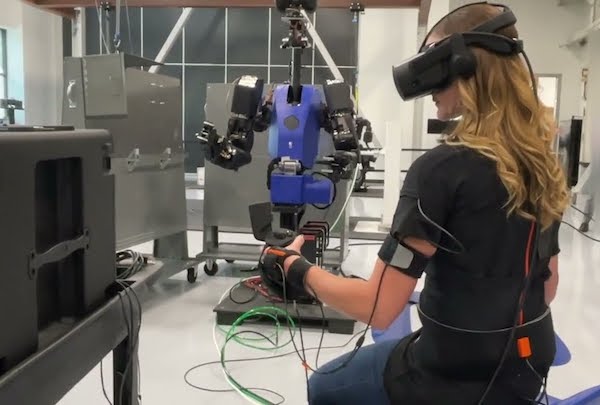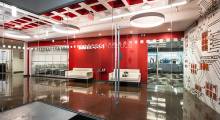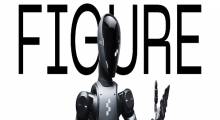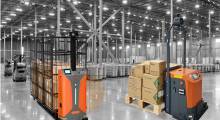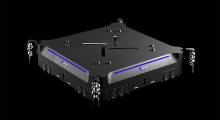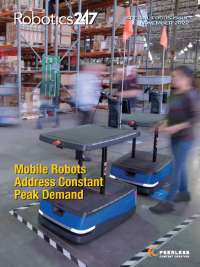Sarcos Defense, a subsidiary of Sarcos Technology and Robotics Corp., this week announced that it has received a $13.8 million contract from Warner Robins Air Logistics Complex at Robins Air Force Base in Georgia. The award came out of an AFWERX AFVentures call for its Strategic Funding Increase, or STRATFI, program.
Sarcos said the contract will support the development, integration, and validation of its AI Computational Service. That service is a framework for success-based reinforcement learning in the Sarcos Guardian robots.
The Salt Lake City-based company said it designs, develops, and manufactures advanced mobile robots and software “to enable the safest, most productive workforce in the world.”
Sarcos added that its systems can operate in challenging unstructured and industrial environments. Its product line includes teleoperated robotic systems, a powered robotic exoskeleton, and software to enable task autonomy.
Contract validates AI priority
“This contract represents a tremendous opportunity for Sarcos as we continue to focus on and invest heavily in the development of our artificial intelligence and machine learning software,” said Laura Peterson, interim president and CEO of Sarcos, in a release. “It will allow us to provide cutting-edge performance enhancements to our Guardian robotics solutions, which will benefit our U.S. Air Force partners and commercial customers alike.”
Sarcos recently restructured and has intensified its focus on AI, she told Robotics 24/7. The contract continues the company's relationship with the U.S. Department of Defense (DoD) and validates its new direction, said Peterson.
“In July of this year, we announced the formation of a new, dedicated AI division,” she said. “[The new division] is focused on taking the innovative AI work our team has been developing for use on Sarcos’ hardware platforms over the past four years and expanding its utility and applicability for use with a wide variety of third-party hardware platforms, including the large deployed base of industrial robots and cobots, as well as mobile robotic platforms such as UAVs, ROVs, and UGVs.”
“Yesterday's announcement, which follows on several prior DoD contracts, validates both the groundbreaking approach and utility of our AI platform,” Peterson said. “We believe that our AI platform, which we intend to offer as a service, will materially reduce the time and expense associated with commissioning, training, and modifying tasks for industrial robots, while also facilitating the evolution from teleoperated mobile robotic platforms to autonomous functions.”
“Based on feedback from our customers, we believe the market opportunity for our AI platform could be massive,” she added.
AI Computational Service to make Guardian smarter
The AI Computational Service is intended to enable the Guardian and future robots to learn from experience. It uses an approach allowing robots to understand their environment, exhibit reasonable behavior in unforeseen situations, and quickly acquire new skills from new experiences, said Sarcos.
Unlike existing algorithms that often require numerous examples to achieve high accuracy, Sarcos said its new service seeks to emulate how humans can successfully generalize from just a single example. By using what the robot has previously learned, the framework can fill in the gaps of unknown scenarios by generating robust and reliable predictions on how the robot should act in any given situation, it claimed.
The aim is to outperform current AI approaches, such as deep learning algorithms, in terms of effectiveness and efficiency. “This will result in improved workflow performance, as well as safer interactions between humans and machines, particularly in unstructured environments,” said Sarcos.
Over the four-year contract, Sarcos plans to continue developing its software for the U.S. Air Force. The company said that the contract aims to improve synergy between human workers and AI technology, ultimately enhancing productivity and safety in various settings and missions.
Throughout the duration of the contract, Sarcos plans to conduct Military Utility Assessments (MUAs) at various locations, including Warner Robins Air Force Base, to test the algorithms implemented on its robots. The demonstrations will address current operational challenges and show how the Guardian line, combined with Sarcos' software, can benefit the Air Force and DoD.
Sarcos Defense has a long history with the DoD
Sarcos said its wholly owned Sarcos Defense subsidiary is led by former U.S. military officers and business leaders “who understand the current and future threat environment and are equipped to deliver solutions that meet the needs of the modern military.”
The company added that it works closely with the DoD and other federal and international government agencies. Sarcos Defense identifies capability gaps, conducts research and development, and rapidly iterates systems. Its stated goal is to “transform Sarcos’ commercial products into specialized, mission-ready solutions that meet the specified requirements.”
“Sarcos has been a key partner for the Air Force and U.S. military for decades,” said Tony Ligouri, Air Force Research Laboratory (AFRL) program manager for the project.
“As we look to incorporate technology that can help airmen accomplish their missions and support readiness efforts, we expect the Sarcos Guardian line of robotics solutions to be a substantial benefit to USAF operations and believe the integration of the artificial intelligence and machine learning framework into these robots will support the efforts of the DoD,” he said.
Article topics
Email Sign Up

